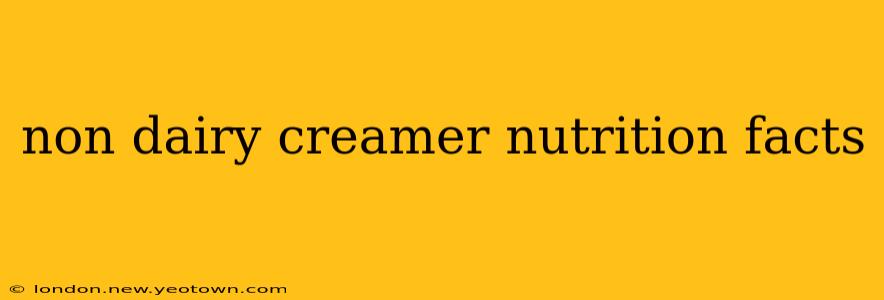Unpacking the Nutritional Landscape of Non-Dairy Creamer: A Deep Dive
Let's be honest, that creamy, dreamy swirl in your morning coffee is a ritual for many. But with the rise of plant-based alternatives, understanding the nutritional facts of non-dairy creamer has become more important than ever. This isn't just about calories; it's about understanding the ingredients, the impact on your health, and making informed choices for your daily routine. My journey into the world of non-dairy creamers started with a simple question: What exactly am I adding to my coffee? This exploration led to some surprising discoveries, and I'm excited to share them with you.
This isn't your typical nutrition label read; we're going beyond the basic numbers to explore the nuances of different types of non-dairy creamers and answer some common questions.
What are the main ingredients in non-dairy creamer?
The ingredient list can vary dramatically depending on the brand and type of non-dairy creamer. However, some common components you'll frequently find include:
- Oils: Often coconut oil or a blend of oils like sunflower, soybean, or canola. These provide the creamy texture.
- Syrups: Corn syrup solids, sugar, or other sweeteners contribute to the sweetness and mouthfeel.
- Emulsifiers: These ingredients help keep the oil and water components blended, preventing separation. Common emulsifiers include soy lecithin or mono- and diglycerides.
- Stabilizers: These help maintain the creamer's consistency and prevent it from separating or becoming grainy.
- Flavorings: Natural and artificial flavorings are added to mimic the taste of dairy creamer.
- Other Additives: Depending on the brand, you might find added vitamins, minerals, or other ingredients.
How many calories are in non-dairy creamer?
This is highly variable. A single tablespoon (about 15ml) can range anywhere from 10-50 calories or more, depending on the brand and formulation. Creamers with added sugar will naturally be higher in calories than those with less or no added sugar. Always check the nutrition label for the specific calorie count per serving.
Is non-dairy creamer healthy?
This isn't a simple yes or no answer. Some non-dairy creamers are considerably healthier than others. The key is to look at the ingredient list carefully. Creamers with minimal added sugar, no artificial ingredients, and a focus on natural oils are generally better choices. However, even these healthier options should be consumed in moderation as part of a balanced diet. Overconsumption of any creamer, regardless of whether it's dairy or non-dairy, can contribute to weight gain and other health issues.
What are the differences between different types of non-dairy creamer?
The market offers a wide range of non-dairy creamers, each with its own unique characteristics and nutritional profile. Some common types include:
- Coconut-based Creamers: These often have a slightly sweeter taste and a thicker consistency. They tend to be higher in saturated fat than other types.
- Soy-based Creamers: These are a good source of protein but might not be suitable for those with soy allergies.
- Almond-based Creamers: These are often lower in calories and fat but may contain added sugars.
- Oat-based Creamers: These are gaining popularity and offer a creamy texture with a mild flavor.
Does non-dairy creamer have any nutritional benefits?
Some brands fortify their non-dairy creamers with added vitamins and minerals, particularly calcium and Vitamin D. However, these additions don't always compensate for potential negative impacts from added sugars and unhealthy fats. It's best to view non-dairy creamers as a flavor enhancer rather than a significant source of essential nutrients.
Are there any side effects of drinking non-dairy creamer?
For most people, consuming non-dairy creamer in moderation won't cause any significant side effects. However, individuals with allergies to certain ingredients (soy, nuts, etc.) should avoid creamers containing those allergens. Furthermore, excessive sugar intake from sweetened creamers can contribute to various health problems.
In conclusion, choosing a non-dairy creamer requires careful consideration of the ingredients and your individual dietary needs. Reading nutrition labels and understanding the components is key to making an informed decision. Remember, moderation is key, and a balanced diet is crucial for overall health and well-being.

